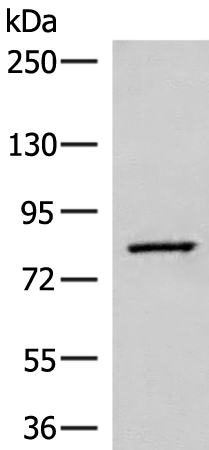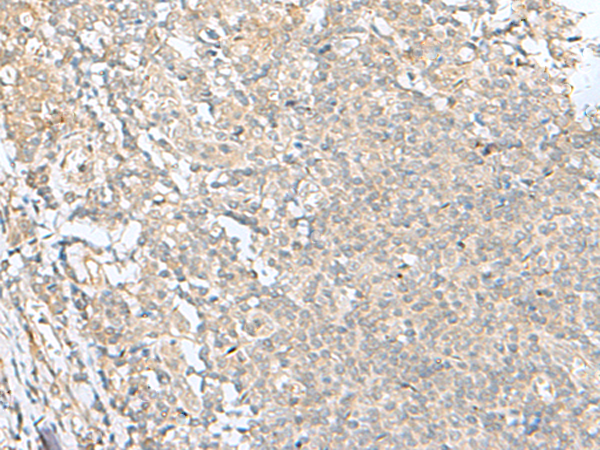

| WB | 咨询技术 | Human,Mouse,Rat |
| IF | 咨询技术 | Human,Mouse,Rat |
| IHC | 1/30-1/150 | Human,Mouse,Rat |
| ICC | 技术咨询 | Human,Mouse,Rat |
| FCM | 咨询技术 | Human,Mouse,Rat |
| Elisa | 1/5000-1/10000 | Human,Mouse,Rat |
| Aliases | CLD; DRA |
| WB Predicted band size | 85 kDa |
| Host/Isotype | Rabbit IgG |
| Antibody Type | Primary antibody |
| Storage | Store at 4°C short term. Aliquot and store at -20°C long term. Avoid freeze/thaw cycles. |
| Species Reactivity | Human, Mouse, Rat |
| Immunogen | Fusion protein of human SLC26A3 |
| Formulation | Purified antibody in PBS with 0.05% sodium azide and 50% glycerol. |
+ +
以下是关于SLC26A3抗体的3-4篇参考文献,按您的要求整理:
---
1. **"Mutations in the SLC26A3 gene cause congenital chloride diarrhea"**
- **作者**: Högölahti, H., Hihnala, S., Lönnqvist, T., et al.
- **摘要**: 该研究利用SLC26A3特异性抗体,通过免疫组织化学分析发现先天性氯泻患者的肠道组织SLC26A3蛋白表达缺失,证实了SLC26A3基因突变与疾病的相关性。
2. **"SLC26A3 in intestinal ion transport and inflammatory bowel disease"**
- **作者**: Wedenoja, S., Pekansaari, E., Höglund, P., et al.
- **摘要**: 通过Western blot和免疫荧光技术,研究揭示了SLC26A3抗体在检测炎症性肠病患者结肠活检样本中SLC26A3蛋白表达下调的应用,提示其与肠道炎症的潜在关联。
3. **"Functional characterization of SLC26A3 variants and their role in human diseases"**
- **作者**: Dorwart, M.R., Shcheynikov, N., Yang, D., et al.
- **摘要**: 利用抗体验证SLC26A3蛋白在细胞模型中的定位及功能,发现特定突变导致蛋白错误折叠,抗体检测为疾病机制研究提供了关键工具。
4. **"Antibody-based profiling of SLC26 anion exchangers in normal and cancerous tissues"**
- **作者**: Salomon, J.J., Albrecht, T., & Hediger, M.A.
- **摘要**: 研究开发了高特异性SLC26A3抗体,并通过免疫组化分析其在正常肠道与结直肠癌组织中的差异表达,提示其作为潜在诊断标志物的价值。
---
以上文献展示了SLC26A3抗体在基因突变验证、疾病机制研究及临床诊断中的关键作用。如需具体文章链接或补充细节,请告知!
The SLC26A3 antibody is a tool used to detect and study the solute carrier family 26 member 3 (SLC26A3) protein, a chloride/bicarbonate exchanger primarily expressed in the apical membrane of intestinal and colonic epithelial cells. SLC26A3 plays a critical role in maintaining electrolyte and fluid homeostasis by mediating electroneutral Cl⁻/HCO₃⁻ exchange, essential for proper absorption of chloride and secretion of bicarbonate. Mutations in the SLC26A3 gene are linked to congenital chloride diarrhea (CLD), a rare autosomal recessive disorder characterized by severe chronic diarrhea and metabolic alkalosis.
The SLC26A3 antibody is widely utilized in biomedical research to investigate protein expression, localization, and function in normal and diseased tissues. It aids in diagnosing CLD through immunohistochemical analysis of intestinal biopsies, where reduced or absent staining correlates with pathogenic variants. Additionally, the antibody is employed in Western blotting, immunofluorescence, and flow cytometry to study SLC26A3 regulation in conditions like inflammatory bowel disease (IBD) or colorectal cancer, where its expression may be dysregulated. Commercial SLC26A3 antibodies are typically raised against specific epitopes, often validated for specificity using knockout controls or siRNA-based silencing. Understanding SLC26A3's role via antibody-based assays contributes to elucidating its pathophysiological mechanisms and potential therapeutic targeting.
×